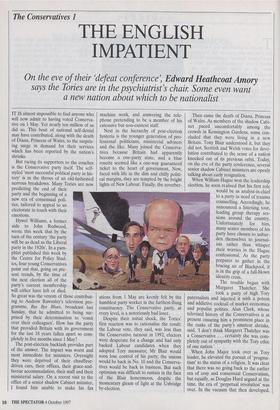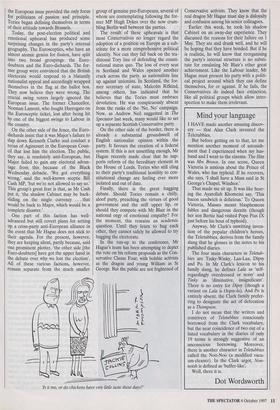The Conservatives 1
THE ENGLISH IMPATIENT
On the eve of their 'defeat conference', Edward Heathcoat Amor),
says the Tories are in the psychiatrist's chair Some even want a new nation about which to be nationalist
IT IS almost impossible to find anyone who will now admit to having voted Conserva- tive on 1 May. Yet nearly ten million of us did so. This bout of national self-denial may have contributed, along with the death of Diana, Princess of Wales, to the surpris- ing surge in demand for their services which has been reported by the nation's shrinks.
But racing its supporters to the couches is the Conservative party itself. The self- The post-election backlash provides part of the answer. The impact was worst and most immediate for ministers. Overnight they were deprived of their chauffeur- driven cars, their offices, their grace-and- favour accommodation, their staff and their ministerial salary. On a recent visit to the office of a senior shadow Cabinet minister, I found him unable to make his fax machine work, and answering the tele- phone pretending to be a member of his extensive but non-existent staff.
Next in the hierarchy of post-election hysteria is the younger generation of pro- fessional politicians, ministerial advisers and the like. Many joined the Conserva- tives because Britain had apparently become a one-party state, and a blue rosette seemed like a one-way guaranteed ticket to the heart of government. Now, faced with life in the dim and chilly politi- cal margins, they are tempted by the bright lights of New Labour. Finally, the reverber- ations from 1 May are keenly felt by the humblest party worker in the furthest-flung constituency. The Conservative party, at every level, is a notoriously bad loser.
Despite their initial shock, the Tories' first reaction was to rationalise the result: the Labour vote, they said, was less than the Conservative turnout in 1992; electors were desperate for a change and had only backed Labour candidates when they adopted Tory measures; Mr Blair would soon lose control of his party; the unions would be back in No. 10 and the Conserva- tives would be back in business. But such optimism was difficult to sustain in the face of the Blair honeymoon, despite the momentary gleam of light at the Uxbridge by-election. Then came the death of Diana, Princess of Wales. As members of the shadow Cabi- net paced uncomfortably among the crowds in Kensington Gardens, some con- cluded that they were living in a new Britain. Tony Blair understood it, but they did not. Scottish and Welsh votes for devo- lution contributed to the sense of a nation knocked out of its previous orbit. Today, on the eve of the party conference, several senior shadow Cabinet ministers are openly talking about early resignation.
When William Hague won the leadership election, he soon realised that his first role would be as analyst-in-chief to a party in need of trauma counselling. Accordingly, he announced a listening tour, leading group therapy ses- sions around the country. Unfortunately for him, many senior members of his party have chosen to unbur- den themselves to journal- ists rather than whisper their worries in the Hague confessional. As the party prepares to gather in the bracing air of Blackpool, it is in the grip of a full-blown identity crisis.
The trouble began with Margaret Thatcher. She took a party of high Tory paternalists and injected it with a potent and addictive cocktail of market economics and populist politics. Alan Clark, whose televised history of the Conservatives is at present ensuring him a prominent place in the ranks of the party's amateur shrinks, said, 'I don't think Margaret Thatcher was a Conservative . . . certainly she was com- pletely out of sympathy with the Tory ethic of one nation.'
When John Major took over as Tory leader, he elevated the pursuit of 'pragma- tism' to the status of a religion. It was clear that there was no going back to the earlier era of cosy and consensual Conservatism, but equally, as Douglas Hurd argued at the time, the era of 'perpetual revolution' was over. In the vacuum that then developed, the European issue provided the only focus for politicians of passion and principle. Tories began defining themselves in terms of their attitude towards Brussels.
Today, the post-election political and emotional upheaval has produced some surprising changes in the party's internal geography. The Eurosceptics, who have an almost atomic genius for fission, have split into two broad groupings: the Euro- doubters and the Euro-diehards. The for- mer group were convinced that the British electorate would respond to a blatantly nationalist appeal and accordingly wrapped themselves in the flag at the ballot box. They now believe they were wrong. The crucial swing voters largely ignored the European issue. The former Chancellor, Norman Lamont, who fought Harrogate on the Eurosceptic ticket, lost after being hit by one of the biggest swings to Labour in the country.
On the other side of the fence, the Euro- diehards insist that it was Major's failure to slap down Kenneth Clarke and conduct a rerun of Agincourt in the European Coun- cil that lost him the election. The public, they say, is resolutely anti-European, but Major failed to gain any electoral advan- tage from this because of the Black Wednesday debacle. 'We got everything wrong,' said the well-known sceptic Bill Cash MP, 'but we're not allowed to say so.' This group's great fear is that, as Mr Cash put it, 'the shadow Cabinet may be back- sliding on the single currency . . that would be back to Major, which would be a complete disaster.'
One part of this faction has well- advanced but still covert plans for setting up a cross-party anti-European alliance in the event that Mr Hague does not stick to their agenda. For the present, however, they are keeping silent, partly because, said one prominent plotter, 'the other side [the Euro-doubters] have got the upper hand in the debate over why we lost the election'. All of these various factions, however, remain separate from the much smaller group of genuine pro-Europeans, several of whom are contemplating following the for- mer MP Hugh Dykes over the now crum- bling Berlin wall between the parties.
The result of these upheavals is that most Conservatives no longer regard the adoption of a position on Europe as a sub- stitute for a more comprehensive political identity. Nor can they fall back on the tra- ditional Tory line of defending the consti- tutional status quo. The loss of every seat in Scotland and Wales opened another crack across the party, as nationalists line up against unionists. In Scotland, the for- mer secretary of state, Malcolm Rifkind, among others, has indicated that he believes that the Tories must embrace devolution. He was conspicuously absent from the ranks of the 'No, No' campaign. Now, as Andrew Neil suggested in The Spectator last week, many would like to set up a separate Scottish Conservative party.
On the other side of the border, there is already a substantial groundswell of English nationalist opinion within the party. It favours the creation of a federal system. If this is not unsettling enough, Mr Hague recently made clear that he sup- ports reform of the hereditary element in the House of Lords. Tories who still cling to their party's traditional hostility to con- stitutional change are feeling ever more isolated and out of date.
Finally, there is the great hugging debate. Should Tories remain a chilly, aloof party, preaching the virtues of good government and the stiff upper lip, or should they compete with Mr Blair in the national orgy of emotional empathy? For the moment, this remains an academic question. Until they learn to hug each other, they cannot safely be allowed to try hugging the electorate.
In the run-up to the conference, Mr Hague's team has been attempting to depict the vote on his reform proposals as the Con- servative Clause Four, with bolshie activists as the dragon and young William as St George. But the public are not frightened of 'is it me, or do chickens have very little taste these days?' Conservative activists. They know that the real dragon Mr Hague must slay is disloyalty and confusion among his senior colleagues.
Earlier this week, he took his shadow Cabinet on an away-day experience. They discussed the reasons for their failure on 1 May. They ate and drank well, and he will be hoping that they have bonded. But if he is realistic, he will know that reorganising the party's internal structure is no substi- tute for emulating Mr Blair's other great achievement. Like the Labour leader, Mr Hague must present his party with a politi- cal project around which they can define themselves, for or against. If he fails, the Conservatives do indeed face extinction, like all political groups which allow intro- spection to make them irrelevant.











































































 Previous page
Previous page